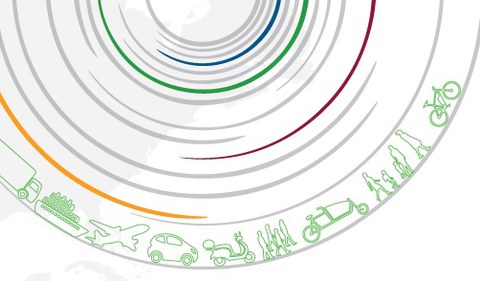Oct 30, 2020
Lecture series 2020 - sustainable mobility

Agenda 2030 - Sustainable Mobility
About the 2030 Agenda and the lecture series
In September 2015, the international community in New York adopted the 2030 Agenda for Sustainable Development. It contains 17 ambitious goals for sustainable development (Sustainable Development Goals, SDG), which are indivisible and mutually dependent. The SDGs are aimed at all countries in the world and take into account all three dimensions of sustainability: social, environmental and economic.
The form in which the 2030 Agenda can be filled with life and the goals put into practice is the main theme of the annual lecture series “Transformation of our world - The 2030 Agenda for Sustainable Development”. On six evenings, experts from business, science, politics, civil society and development cooperation will present their perspectives on one aspect of the 2030 Agenda. The digital lecture series 2020 is dedicated to the topic of "sustainable mobility". It is a cooperation between the German Society for International Cooperation (GIZ), Engagement Global, and the sustainability initiative SUSTAIN IT! and the Sustainability and Energy Unit at Freie Universität (FU).
Lecture series 2020: Is sustainable mobility finally picking up speed?
Being on the move plays a central role in societies around the world, often as an expression of quality of life. Globalization cannot be imagined without the worldwide mobility of goods, people, services and flows of all kinds. The downside: All in all, this mobility devours massive amounts of finite resources, and its emissions put a strain on the climate, air quality and health. Special forms of mobility, for example digital, could in turn help reduce resource consumption. The lecture series 2020 is dedicated to this complex of topics and highlights opportunities and challenges for sustainable mobility in the future.
The influence of mobility is already far-reaching for global sustainable development. In view of a rapidly growing and increasingly mobile world population, it will increase massively. In an industrialized country like Germany, the share of CO2 emissions from traffic is around 20 percent. How can we prevent the globally growing mobility from causing ever greater damage to the environment and nature? In addition to ecological sustainability issues, there are also social and economic aspects: Mobility is increasingly becoming a prerequisite for development and equality opportunities, and in Germany, for example, it is a motor for economic growth.
With a view to the 2030 Agenda, the topic of mobility has important interfaces with practically all 17 goals. Whether health and well-being (Goal 3), high-quality education (Goal 4), industry, innovation and infrastructure
(Goal 9), less inequality (Goal 10), sustainable cities and communities (Goal 11), or even sustainable consumption and production patterns (Goal 12): They are all closely linked to questions of mobility.
What concrete approaches are there already and which ones still need to be developed so that the mobility of the future can contribute to achieving the sustainability goals? We get to the bottom of these and other questions together with our guests. The speakers broadcast live from the GIZ representative office in Berlin. They shed light on the topic from a theoretical and practical perspective in short presentations and are then available in a moderated discussion for suggestions and questions from the digitally connected audience.
We cordially invite you to join in the discussion when it comes to ecological, urban, social and economic aspects of mobility.
More information and registration - (be aware: the lecture series is presented in German)
